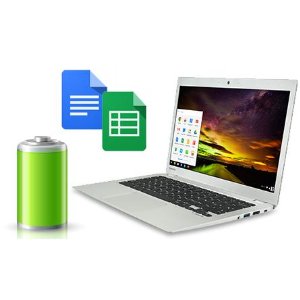How to prevent Google chrome from sucking your laptop battery fast
Google Chrome is that one browser that you will love and hate, but somehow you can always find yourself back. When the browser really gets your skin down, you have to use your computer, and you don’t have to get an electric outlet right away. I mean the occasion, just like when you are a long distance travel, like to travel by plane, by train or by coach.
During such occasions, you really want to get the maximum hours out of the charge available on your laptop battery. Well, if you are going to use Google Chrome, then be prepared for your battery to drain faster. Alternatively, you could switch to alternative browsers like Microsoft Edge or Opera. The former claims to be the best at consuming least battery power, while the latter has a battery saver mode that makes the browser use less power.
Truth be told, if you are used to Chrome, changing to a different browser just feels awkward. Plus, there are those new passwords and bookmarks saved on Chrome, that would need you to import into the alternative browser you will choose. Sounds like a lot of work, doesn’t it?
How to use Google Chrome on battery but consume less power
If you could have your cake and eat it, that would be great, and the following are some little tricks we have picked up. That will help you get extra minutes out of your Dell latitude d620 laptop battery while using Chrome browser.
Ø Always run the latest version of the browser
There have been many complaints about Chrome eating too much RAM and draining the battery faster. Do you honestly think Google is deaf to these complaints? Of course, not. Not when the likes of Vivaldi, Firefox, Opera, and Edge are working overtime to overthrow it.
In fact, Google has somewhat addressed this issue in the most recent version of the Chrome browsers. So update your Chrome to the recent version, as in the recent release, Google has made the browser less of power and memory hog.
Ø Get rid of unnecessary Extensions
One of the greatest things about Chrome is the extensions. They make our browsing easier, but each extension added to the browser is more loads for your computer and the faster your battery will drain; especially, extensions that run offline.
So don’t keep around extensions you don’t need and regularly use. You can try first disabling them, and if you find out you don’t even miss them, then hit the trash icon to delete them completely from your system. To get to the extensions page, type “chrome://extensions/” into the address bar.
Ø Suspend opened but unused tabs
We live in the age of multitasking, and tabs are one of the best things to have ever happened to browsers. Opening one, two, three…tabs is not a problem, but when you keep 10,15,20…tabs opened at the same time. You are actually putting your laptop RAM and battery on overdrive.
The solution to this problem would be to close opened but unused tabs, but we tend to forget that. So you need to install this extension, The Great Suspender, to suspend unused tabs, but not actually closing the tab. When you click that tab, the web page automatically loads to where you left off.
Ø Kill Chrome running in the background
To support those helpful web apps, such as Google Hangouts, Chrome needs to be always running. And it does so, even when you close the browser; it keeps running in the background as the default setting. Obviously, that keeps draining your battery faster and hogs your RAM space. Type “chrome://settings/” into the address bar to go to the setting page and disable Chrome running in the background when you close the browser.
Ø Make Plugins Click-to-Play and Block Flash
On your regular browsing, the aspects about a web page that puts a demand on your computer resources are plugins. Like the Adobe’s infamous Flash. To ease the demand on your computer resources from plugins, you need to be very selective about which ones will run when a web page loads up.
Yes, you can disable individual plugins, but the recommended approach is to make each plugin to request permission to run each time. That way, only you determine which plugins get to run, and which ones don’t. Type “chrome://settings/” into the address bar and go to “Show advanced settings” and expand the menu and click the on the box marked “Content settings ” under the Privacy.
Ø Stop Google Drive offline
Google Drive offline gives you access to offline web pages like Docs, Sheets, Drawings, and Slides. Having it enabled, just keep the web page running there in the background, and more often than not, most users don’t even know they have these features enabled. While they are useful for documents you store and edit offline, if you can do the same online, there is really no need of having them running offline and in the background.
These are a few of the tips on how you can reduce Google Chrome memory and power hog behavior. There are plenty of other tricks out there, if you know some that are not included above, be kind enough to share with the rest of our readers by stating it in the comments section below.
Did you enjoy this post? Why not leave a comment below and continue the conversation, or subscribe to my feed and get articles like this delivered automatically to your feed reader.


Comments
No comments yet.
Sorry, the comment form is closed at this time.